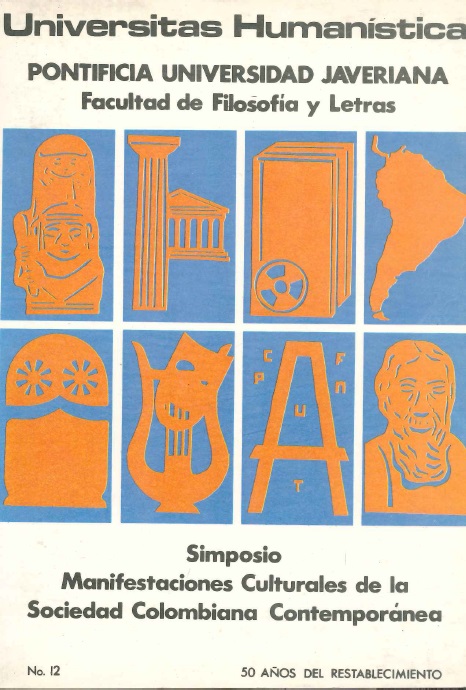Abstract
1. Objetivo:
Perseguimos como objetivo de esta elaboración la pregunta por la posibilidad de una filosofía colombiana a partir de la reflexión sobre el pensamiento de Fernando González Ochoa.
2. Introducción
Respondiendo a la pregunta sobre la existencia de la "Filosofía Colombiana", Andrés Holguín nos dice: "No creo que exista propiamente dicha, una 'Filosofía Colombiana' y, por tanto, resulta imposible hablar de sus rumbos. La filosofía ha sido escasa en América Latina y, como forma especializada de expresión casi inexistente en Colombia. . . Creo, de otro lado, que el pensamiento filosófico colombiano —si existe— no debe buscarse en los libros o notas de los especialistas de filosofía —que han sido, salvo pocas excepciones, solo divulgadores o comentadores— sino en obras que, al parecer desvinculadas de la filosofía, poseen sin embargo, ideas, conceptos y actitudes mentales que sería errado no calificar de filosóficas. . . De este modo si no existe una filosofía colombiana expuesta temáticamente, como ya dije, es incuestionable que se revela o trasluce una posición filosófica en escritores como Caro, Suárez, en poetas como Pombo y Silva, en novelistas como Tomás Carrasquilla, ensayistas como Fernando González y Jorge Salamea Borda...

This journal provides immediate open access to its content on the principle that making research freely available to the public, encourages greater global exchange of knowledge.
The journal Universitas Humanística is registered under a Creative Commons Attribution 4.0 International Public License. Thus, this work may be reproduced, distributed, and publicly shared in digital format, as long as the names of the authors and Pontificia Universidad Javeriana are acknowledged. Others are allowed to quote, adapt, transform, auto-archive, republish, and create based on this material, for any purpose (even commercial ones), provided the authorship is duly acknowledged, a link to the original work is provided, and it is specified if changes have been made. Pontificia Universidad Javeriana does not hold the rights of published works and the authors are solely responsible for the contents of their works; they keep the moral, intellectual, privacy, and publicity rights.
Approving the intervention of the work (review, copy-editing, translation, layout) and the following outreach, are granted through an use license and not through an assignment of rights. This means the journal and Pontificia Universidad Javeriana cannot be held responsible for any ethical malpractice by the authors. As a consequence of the protection granted by the use license, the journal is not required to publish recantations or modify information already published, unless the errata stems from the editorial management process. Publishing contents in this journal does not generate royalties for contributors.


